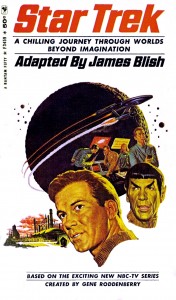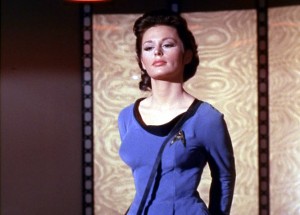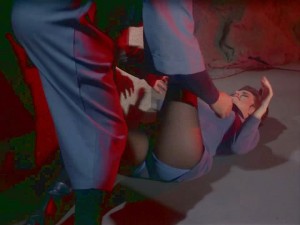Well first off, she’s a redhead, isn’t she? Redheads are special in science fiction. Nix that. Redheads are special, period. Science Fiction authors just get this basic, universal truth, carved as it was by God on the same stone tablets He used when he gave us the Declaration of Independence and the script for It Happened One Night. Ask Robert Heinlein or Alan Dean Foster. Redheads. Yeah.
Some of you are asking “Who the Hellen Noel is this chick you’re babbling about?” I’m glad you asked. Dr. Helen Noel is the expert in psychiatric medicine who accompanied Captain James T. Kirk when he went to investigate the evil doings at the Tantalus Colony in a Star Trek episode titled “Dagger of the Mind.” She was played by the beautiful, the absolutely ravishing Marianna Hill. Kirk was attracted to her (for good reason) and had attempted a pickup once at a Christmas party, thinking she was just a passenger and not one of his crew. (Yeah, Jim Kirk is my hero, but this really is one of “those” moments he has with women. You didn’t know she was one of the crew, Jim? Seriously? How frickin’ clueless are you, cowboy?)
Now, to be clear, it’s only in Blish’s version that we learn that Kirk thought she was a passenger. When James Blish, noted critic and hugo-winning SF author, was first commissioned to novelize episodes of the then-unaired Star Trek, he was given what were apparently the only scripts available, those being rough drafts of the episodes that were still in production, if that. They were rough and they were different than the stories that aired. When “Dagger of the Mind” was seen on TV, Kirk was just pissed that this woman he’d once made a pass at was going on a mission with him. So, on TV, Kirk’s an irresponsible asshole who tried to boink someone under his command (apart from Spock, because my friends in zinedom say that that would be completely okay, and I believe them). In the book, he’s just a douchebag who’s so out of touch with his people that he doesn’t know one when he meets her out of uniform. Funny, ’cause out of uniform is exactly how he wanted to get Helen.
Blish kinda did Jim-boy a favor. Kinda. (Don’t get your non-existent chest-hairs in a tangle, Jim, we love you. We really do.)
But Helen Kicks Ass. There’s evidence. Actually, she kicks solar plexus, and there’s high voltage involved. Close enough.
The irony here (let me take it out of the box so you can examine it) is that I always liked Helen, never cared at all for “Dagger of the Mind,” was not enthused about reading it in Blish’s collection, got inspired to watch the episode again because I did read it… and the written version is missing the inspired ass-kicking of the lovely Dr. Noel. Nor did I realize it was missing when I read the story. My sub-conscious must just have said, “Dude, there’s an ass-kicking missing from this story, and we need to go find it so we can own that ass-kicking, we can take it home, feed it, care for it and love it forever.”)
Did I ever say my subconscious was in any way mentally healthy? No I did not, so stop looking at me that way.
Here’s the deal: Dr. Adams (the Villain) has this electric chair that he uses make people do his bidding. It causes their heads to explode if they think the “wrong” thoughts, and so they only think the ones he tells them to think. Bad guy. He puts Kirk in this chair. Repeatedly. (Okay, the first time, Kirk gets in the chair on his own, but that’s not important now.) Using the chair, he makes Kirk fall in love with Helen. (Hey, I didn’t say Adams was all bad, now did I?) Kirk knows that the only way to win the fight at hand is to not be in love with the gorgeous doctor (ah, irony, thou art a flying, whirling bitch!) so he needs someone to cut the power to the chair. Helen is the only “someone” at hand who isn’t under Adams’s control, so he sends her. She snakes her way through AC conduits to the power room, where she knows that, if she touches the wrong thing, she’s going to be struck with instant death. If she touches the right thing, the chair will shut off, and Kirk will be out of love with her. (Irony, stop!!!)
Helen touches the right thing. Of course she does, she’s Helen. The chair is disabled, Kirk escapes, the day is saved. Except… before Kirk and Helen can re-unite, two or three of Adams’s goons show up to check the power. One of them catches Helen and throws her to the floor. He stands in front of the high voltage grid to gloat for a moment. Helen rears back and kicks him into the power grid. Now you know I’m repulsed by violence, and this instance of it is no exception. The bad guy would have been so tasty had she rolled him in breadcrumbs first, but, no, she deep fried him dry and then he was just a disgusting mass of dead guy.
Yeah, I hate violence, but I’m sorry. Uhura never got farther than giving mirror Sulu a little shave with a letter opener (oh, my!) and Chapel? Janice Rand? Chapel had to make it to the cartoons to earn any Chutzpah, and then she demonstrated that she could… swim. In a fish tank. Rand? “Captain! Look at my legs!” No, Captain, look at Helen’s legs. They just barbecued a guy! You need this lady on every. single. landing. party.
In the book, the entirety of this aforementioned coolness is covered thusly: “The pain soared, almost to ecstasy-and at the same instant, all the lights went out but a dim safe light in the ceiling. Kirk did not have to stop to think what might have happened.” That’s it. Blish doesn’t even establish with any real emotional power what danger Helen is in. He has Kirk say, “Don’t touch any of those power lines. It’ll be a bad squeeze.”
Oy.
I love Star Trek. I still watch it all the time. It still inspires me. Nor do I think that any of its offspring surpass or even equal it in any way. The original is still king. But the one thing that’s always torqued me off is that my favorite Captain never had the privilege of sharing multiple adventures with a woman who was his equal. He had lots of beautiful love interests, lots of brainy love interests, lots of courageous love interests; but they never hung around, and none of them handled herself in a fight the way Kirk handled himself, except the lovely Dr. Noel.
Imagine if she’d stayed on the show: She could have spotted the psycho in the Shakespeare right away, saved Kevin Riley from drinking bad milk, and kept who knows how many tooth marks off the scenery in the Enterprise theatre. She could have asked the Tribbles to discuss why the needed to eat so much, revealing their childhood traumas and making them productive members of society. With Helen around, we would have had a Tribble security officer, because, after all, how can you not feel secure when a big ball of fluff enfolds you? The god Apollo? He wouldn’t have stood a chance. With a snap of her psychiatric fingers, his wish-fulfillment fantasy of a giant hand would have vanished (’cause you know why a boy wants big hands, don’t you?) and he could never have taken the Enterprise crew captive. What we’ve missed!
The Trek creators tried, years later, by adding the beautiful Beverly Crusher to the crew of the 1701-D. But while Gates McFadden is lovely, the writing of her character was not. Beverly and Jean Luc were both so stupidly indecisive and lacking in self-knowledge that any resemblance between Dr. Crusher and a real red-headed SF heroine was cast out the airlock, where it surrendered to the Q and died of ennui.
The Blish version of this story does have one cool feature not included in the episode: On TV, Dr. Adams dies of loneliness because the chair comes back on while he happens to be in the room. In the book, Lethe, one of his assistants, quite deliberately kills him using the chair. It’s a nice moment, and well-deserved by the bastard. On the other hand, Lethe, who looks like Ayn Rand on Quaaludes, is not a redhead and never, in the history of reality, did she kick a guy into a grid carrying mega-voltage. The producers and director must surely have realized that this lackluster character did not deserve a moment of coolness in an episode that featured Helen Noel. Lethe is not cool. Sorry, Lethe.
End of rant. Take-away point, and this will be on the test: Helen Noel kicks ass, and I’m sure James Blish would agree. Had he seen Marianna’s performance, he would certainly have added extra ass-kicking to his story. And the producers would have read the book (because all producers read the novelizations of their shows, it’s the law) and realized that Star Trek could not survive without Helen. So. Yeah. There you have it. Star Trek was canceled because Helen Noel was not made a regular. You wondered. Now you know.
 But about James’s (do you mind if I call you James?) book. “A Chilling Journey Through Worlds Beyond Imagination.” Seven tales of the Enterprise, which legend says were written before any of us saw the Enterprise, (except those who saw the screening of “The Cage” at the 1966 World Con) by a guy who didn’t see the Enterprise until years after he’d written most of her adventures, on accounta he lived in the UK. “Charlie’s Law” (“Charlie X”) is notable in that it portrays Kirk as a man in his late forties (his career, which we presume began at about age 22, spans over two decades), who considers himself too old to parent a teenager. Charlie is given a more believable, mercurial personality, and the edge of danger in his sexual obsession with Janice Rand is both darker and more plainly delineated. “The Unreal McCoy” (“Man Trap”) cuts out all the secondary characters and kills Crater (here named Bierce) off screen. So off screen that we aren’t actually told that he died when it happens, only later, and in such a way that we aren’t actually sure how he could have died.
But about James’s (do you mind if I call you James?) book. “A Chilling Journey Through Worlds Beyond Imagination.” Seven tales of the Enterprise, which legend says were written before any of us saw the Enterprise, (except those who saw the screening of “The Cage” at the 1966 World Con) by a guy who didn’t see the Enterprise until years after he’d written most of her adventures, on accounta he lived in the UK. “Charlie’s Law” (“Charlie X”) is notable in that it portrays Kirk as a man in his late forties (his career, which we presume began at about age 22, spans over two decades), who considers himself too old to parent a teenager. Charlie is given a more believable, mercurial personality, and the edge of danger in his sexual obsession with Janice Rand is both darker and more plainly delineated. “The Unreal McCoy” (“Man Trap”) cuts out all the secondary characters and kills Crater (here named Bierce) off screen. So off screen that we aren’t actually told that he died when it happens, only later, and in such a way that we aren’t actually sure how he could have died.
“Balance of Terror” does poor Angela the favor of being a bride for an hour, which is more than the episode did for her. But it completely lacks any appearance by the Romulans as characters. (I know, right?) “The Naked Time” gives the plague world a name that has made me laugh evilly since I first read the story in second grade: “La Pig.” Every planet in every SF adventure should be named “La Pig.” That none are shows that the human race does not deserve such instances of good fortune as a glass of Dogfish Head Midas Touch. “The Conscience of the King” features more direct Shakespeare quotes than the episode, but lacks Kevin Riley. The standout story, believe it or not, is “Miri.” The setup is incredible. After a disaster called the “Cold Peace,” humanity expanded outward to all the nearest worlds to set up colonies and avoid persecution. Now, it’s the 27th Century. (Yep! No one had called it at that point. Indeed, Trek aired for three years without a date ever being given. I knew in the early 1970s that it was set in the 23rd Century, but I don’t know how I knew!) The Enterprise finds an earth-like world where earth humans settled, tried to make themselves immortal, and mostly died. Miri is the same Miri she is on TV, but her annoying friends are only seen very briefly, they don’t have time to be annoying, and Jim never even thinks the words “No blah blah blah!” Since I know this was an early draft script, I would really like a sober explanation of why anyone thought it was a good idea to change that back story to “Oh look! A twin earth! With humans who aren’t related to us in any way, living on the Paramount backlot!”
Good story. They’re all good stories. Blish was a solid writer, his excision of Helen’s kick notwithstanding (and maybe he never knew it happened!). This book succeeds very well at actually making me feel that there was a “book version” of Star Trek, and it was different from the version we knew, with characters who were older, who behaved differently at times, and who somehow had a little more texture than you can fit into a TV screen.
But if I ever finally do get a chance to write a Star Trek novel for money, it’s gonna be about Helen Noel. Imagine if you will a Star Trek adventure in which a trained psychotherapist gets a shot at handling some of the galaxy’s greatest loonies. At a time when we want to have a “dialogue about mental health,” I think the lady would have some very interesting lessons to teach us. And no, she wouldn’t always do it by kicking people into high-voltage grids. She’d save that for, y’know, Christmas and stuff.



I’m still hoping to find James Blish’s adaptation of The Arbiter Chronicles’ unproduced epic “Darby Must Die!”
Pingback: I Just Saw the Best Wonder Woman Movie of 2017 (And It's Not the One You Think It Is) - Steven H. WilsonSteven H. Wilson